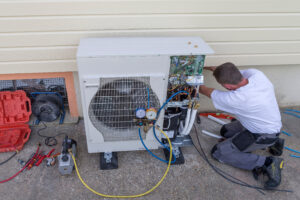Rishi Sunak will introduce a business rates exemption for green property improvements including solar panels and heat pumps in an effort to encourage investment in making buildings energy efficient.
Treasury officials have told businesses to expect the chancellor to announce new rates relief for investments in plant and machinery that make shops, offices and warehouses greener in today’s budget. The exemption will include investments in features that improve working environments such as ventilation, according to briefed sources.
The move could save businesses tens of millions of pounds if they invest to build or refurbish in an environmentally friendly way, analysis by Colliers, the property consultancy, found.
Businesses hope the announcement will be among initiatives unveiled by the chancellor to give them incentives to invest as they face headwinds of rising inflation, tax increases, a rise in the minimum wage, higher energy costs and supply chain challenges.
Under the present business rates system, companies are penalised for making such investments because they cause a property’s value to increase, which makes the rates bill rise. The disincentive means that investors have not included improvements such as solar panels on buildings, the British Property Federation says.
A Treasury report published in March summarised responses to a call for evidence for its fundamental review of business rates, noting that more than 40 per cent of respondents wanted to see exemptions for green energy generation, including solar and wind.
John Webber, head of business rates at Colliers, said: “In terms of impact, whilst this may not be a ‘make or break’ in the decision to build or refurbish a building in an environmentally friendly way, we believe we could be seeing savings of tens of millions of pounds over time. Even a 5 per cent reduction in the rates bill of a building over its life span could be a very significant saving.”
Lobby groups including the CBI and the Federation of Small Businesses have urged ministers to address the flaw in the rates system. Craig Beaumont, chief of external affairs at the FSB, said: “It makes no sense when a small business invests in solar panels or heat pumps to tackle climate change that the valuation of the property rises, and so the annual business rates bill rises for ever more.
“This counts the same for investment in things like ventilation or other measures that improve the environment for staff. It’s time to get rid of this disincentive to investment.”
A more radical reform of business rates is expected to be delayed. Business groups with nine million employees have warned of shop closures if the system is not overhauled.
The present system takes no account of trading performance and penalises bricks-and-mortar outlets compared with online retailers.
Rates are based on property values from 2015, which do not reflect the fall in the value of high street shops and shopping centres after the rise of online shopping and the impact of Covid-19.
A Treasury spokesman said: “We’re conducting a review of business rates, which will conclude in the autumn.”
Read more:
Budget to announce business rates relief to aid green property investment
















